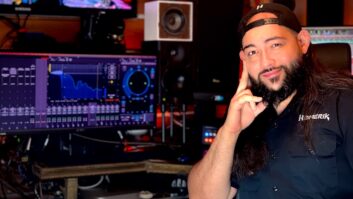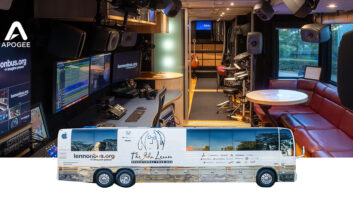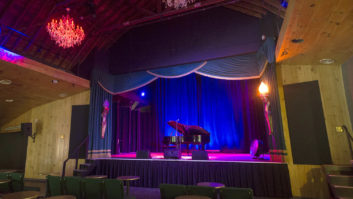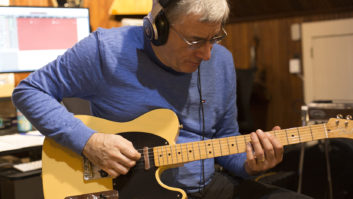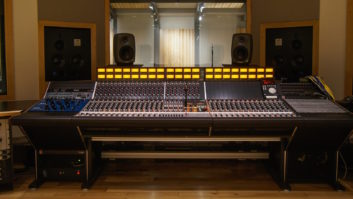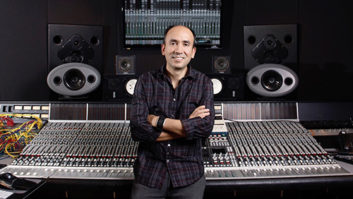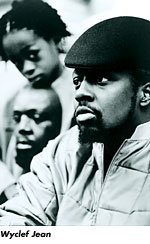
“Producers are really…you just know that you’recreated to produce.” Subconsciously, Wyclef Jean knew from a veryearly age that music would play a very large role in his life. Born theson of a preacher in Croix-des-Bouquet, Haiti, Jean’s family moved tothe Marlborough projects in Brooklyn when he was nine years old. Soon,he found himself immersed in the musical side of his father’s church:playing music, acting as choir director, creating arrangements for thechoir and the church band, and recording and producing choir albumswith his cousin Jerry Wonda. During his teenage years, he took upguitar and studied jazz in his high school’s music department. He washooked!
Jean (pronounced the French way) may still be best known for hiswork with the best-selling rap group, The Fugees, but a slew ofmulti-Platinum solo projects (including a Best Male R&B VocalPerformance Grammy nomination for “Gone Till November”) andworking with numerous other artists led him away from the band and ontohis own musical path. Fusing streetwise hip hop and rap with as manydifferent styles of music as he could (most notably reggae), Jean’ssolo albums have rocketed up the charts and even landed him his ownrecord label: Clef Records, a joint venture with Clive Davis’ JRecords. Bridging the gap between his conservative Caribbean upbringingand the wild environments of Brooklyn and New Jersey, Jean has beenable to move effortlessly between different musical genres, signing andproducing an eclectic roster including such unlikely artists as MickJagger, Kenny Rogers and Tom Jones. However, his greatest successeshave come from producing and collaborating with Destiny’s Child, Maya,Carlos Santana, Whitney Houston and Michael Jackson.
Like so many of his hip hop counterparts, Jean has taken personalcontrol of nearly every aspect of his career:producing/composing/arranging his own work and other artists in hisstudio with partner Wonda. What began as a project studio in Norton,N.J., the Booga Basement has expanded into a full-size recording spacein midtown New York City, now dubbed Platinum Sound.

Why were you interested in opening up your own studio andbringing it over from New Jersey, as opposed to just working inManhattan’s commercial studios?
It gets tiring knowing that you get a 12-hour block, and after 12hours, you have to leave. You have to pay overtime. You never get usedto a space because you keep changing spaces. And then when you do getused to a space, at the end of the year, you pay $5 million for it. Soas opposed to doing that, it was better to just have a place where wecould just come to every day and work.
We had the Booga Basement [project studio] in Jersey. Actually, thiswas all Jerry’s idea, because I was not for it.
How come?
Because that shit cost a lot of money. I was like, “Yo, weshould take our time.” He’s like, “Okay, cool. We’ll buythe space first. Once we get the space, then we’ll take ourtime.” Next thing you know, we have this space. We had one SSLboard, and then some clients came in and they were like, “This ishot, but we heard that another studio’s the only one with the NumberOne SSL board: a K.” I was like, “J, what the f*** is aK?” And he was like, “Yo. That’s the hottest SSL.” Isaid, “Man, we gotta get that, because that’s the Number Onething.” And we’re trying to be one of the Number One studios inNew York City, which we are.
It’s very stressful [having your own studio], if you’re going to doit right. When I think about the biggest studios in New York, they’reowned by people that are not musicians or artists, and artists come inand spend their money there, and they’d rather do that, as opposed togetting the headache. So they pay someone else to get the headache. Inthis situation, we grew up with a studio [Booker Basement].
Do you think that’s happening a lot in hip hop? Artists who arejust popping up and opening their own studios?
Definitely. Puffy’s got Daddy House. Everyone is starting in line. Ithink with everything that’s going on in the world today —financially and the economics of society — it’s very important tobe self-sufficient with your business. I don’t only think that youshould have your own studio, but you should also have your own studio,your own mastering facility, your own post room so you can cut your ownvideos. Because when you’re an artist, if you get a 10-year run —some are over 10 years — and you’re successful, if you make over$20 million, then you gotta figure the money that you dished out andyou spent on videos and studio time and all that stuff, you were justbetter off investing $4 or $5 million. You would have been savingyourself a whole lot more money. That’s why I encourage everybody toget self-employed.
What kind of equipment were you looking for?
Our dream was always to get an SSL. I would say everyone that I’m inthe business with — whether it’s Carlos Santana, Whitney, MichaelJackson, different people — everyone loves the sound of the SSL.We’re getting in that form of business: to make sure you have not onlywhat yourself as an artist is looking for, but what your clients aregoing to be looking for.
What other pieces of equipment were you looking for when Platinumfirst opened?
I like Neves. I love the pre’s, EQs, compressors; I love the SSLcompressors. Those were the things we were looking for. We neverimagined that we would have two SSL boards.
What was it about the SSL consoles that you liked?
I think it’s about the warmth of the console: We wanted an analogconsole. It gives you exactly the sound that you’re looking for. If thesound of the console makes the music come out too clean, I think with alot of hip hop, a lot of reggae, a lot of rock, just straight-upthrashing…I think the sound of the SSL is more hard-core to whatyou’re looking for. And at the same time, you can reverse the consoleand do a music score on it. I think the magic of it is making it sounddark when you want and then turning it around and making it sound epic.I’ve worked with a lot of consoles and they’re great. I’m not knockingthem. But they ain’t no SSL.
You guys are going for a really warm, analog-type sound.
Yeah, ’cause it’s rebel music, baby!
Were there any special room treatments to make sure you kept thatrebel sound?
We brought in [designer] Frank Comentale. He did Chung King, HitFactory, a lot of different studios. It was very important to bring himin and be a part of the whole design, because we love the way the roomsounds at the Hit; we love the warmth. He was great. We also had AndyGrassi — one of our mix engineers — give his inputregarding the wiring, design and room specs during construction, aswell as Scott Jackson to make the deals, to get the equipment and keepus running.
So you and Jerry are both producers. Do you switch off productionduties on a single project or are you both behind the board at the sametime?
The way we work, it’s like we’re brothers, you know? We’re cousins.And we play everything. I would say Jerry’s probably one of the topfive best bass players I’ve ever heard in the world. So Jerry usuallycomes with the crazy bass and drums. Specializing in that realhard-core…
Low end.
Yeah. Definitely. I specialize in lyrics and melodies. I’m good withthemes.
So you bring everything to the table all at once.
Yeah. That’s how we do it. But it’s funny, because Jerry taught mehow to play bass. His brother taught me how to play guitar when we werelittle. So we switch off instruments. We play keyboard, piano. The waywe learned all this was, when you’re in the studio at a young age,you’re not aware that there’s a union where you can hire musicians. Soyou have all of this equipment and you just learn how to play ityourself. We’re like, “We’re not gonna get no drummer. We’ll playthe drums ourselves.” That’s how we learned it. But I would thinkthe way that we produce is like Sly and Robbie, or Jimmy Jam and TerryLewis; that sort of vibe. We vibe together.
What Wyclef and Jerry represent as producers is we’re innovators. Sowhen you get a Wyclef/Jerry Wonda record, don’t count on it soundinglike anything that you’ll hear out there. You have two choices: Youwill either like it or not like it. But we can guarantee one thing:It’s not going to sound like what’s out there. We try to bring a lot oflive musicianship to the music. A lot of grooves. We’re Caribbean; wefrom the islands. Out of the music industry, I’d say we’re theCaribbean producers of the world.
Do you think being family brings an added bonus to workingtogether? Kind of like “keeping it in the family”?
They call us the “Haitian Sicilians,” because wedefinitely family! Here’s my brother, Sam, he’s the lawyer; he handlesthat. Then there’s Jerry’s brother Renel; he handles the label stuff.We definitely keep it family-oriented.
Do you and Jerry have a certain way of producing other artists?Or, is it similar to recording and producing your own releases?
When we produce our stuff, we’re cool. But when you’re producingartists, you take the role of a psychiatrist — a musicalpsychiatrist. You have to work slowly with an artist to show them howto do it. It’s all about just doing the best music for the individual.That’s what you’re getting paid to do.
But our music is more rebel music. We do music for society, forhumanity, to help and to heal. I don’t do music so it’s the Number OneBillboard on a bullet all the time. We sold so many albums, andwe gonna keep on selling, because that’s just the way it is. We got thePlatinum Sound formula.
What’s that formula?
You gotta be born with it, baby. We walk with the lip, we talk withthe slang. And we pretty. We pretty, baby. We move like Ali in hisyoung days. We good with the jab, good with the stab.
You guys have worked with artists who were just starting out.What was it like working with Destiny’s Child and watching them explodeon the music scene?
We’re fortunate enough to work with everybody when they’re justgetting started. And they come to us and say, “Clef, Jerry, couldy’all give us a lift-off?” Working with Destiny’s Child wasincredible. We see the potential. In the line of work we are in, youcan see who’s gonna blow and who’s not gonna blow. And what I lovedabout Beyonce and Kelly the most — when I worked with them in thestudio — is their attitudes: humble, they laid back. And that’sthe attitude that determines how long you’re really gonna last in thisthing.
How did you guys go ahead and produce them, especially becausethey’re so vocal-oriented?
It was definitely a unison thing. We were trying to find a stylethat would fit what we were trying to do: We had to come up with a songthat would blow up.
A radio-friendly song.
Yeah. So I had to make sure that the style was gonna fit. Beyoncesung the lead and they did backgrounds. That song was “No, No,No.” The way we did their vocals was, individually, you stackharmony. “Okay, you go in there, do the alto note. Okay, that’sgreat. Come back out. Do the soprano note.” We recorded them onthe SSL and used Neumann mics.
What about any outboard gear, digital effects, synthprogramming?
Well, that’s my engineer. He’s the master of effects, to the pointwhere we like, “Yo, man, too much effects, dude. Keep my shitraw, man!” [Laughs] For outboard gear, I know we use a mix ofclassic and cutting-edge gear, including Eventide, AMS Neve, Lexicon,Avalon and Manley.
You’re working in analog and digital. What do you likebetter?
It depends on what it is. I think for scoring, definitely digital.Reggae stuff, I like it analog.
So was your approach to working with Destiny’s Child the same aswhen you worked with Maya?
No, it was a different approach for Maya. Nobody knew who she was. Igot a call from Jimmy Iovine, and I was doing a record for Frye, andJimmy was like, “Can you throw her on the hook?” At thetime, she had a very soft voice, so my approach was definitelydifferent with her. It was a real nice voice. I just made her feelcomfortable and let her know that she can do it, like inWaterboy: “You can do it!” So she got in thebooth and we started cutting her vocals. She was on a hook, so I hadher sing it a few times and sampled back what we liked, and that wasit. We used the SSL and had a 48-track. That was analog.
What was it like working with Michael Jackson?
He’s cool with us. We got no beef with Mike. You mean, is he weirdor something?
No, I mean, is he the King of Pop?
Yeah. Without no doubt. He’s definitely the King of Pop. People cantalk about Michael Jackson as much as they want. But the minute MichaelJackson actually shows up and you see it’s him, you’re just like,“Oh shit, that’s Michael Jackson!” You forget all thatbullshit you said about him.
So what is he like in the studio?
He cool, he laid back. He talks to us. What I picked up on MichaelJackson — because I study people when I watch them — theway that he counts his rhythm with his feet and his neck at the sametime is crazy.
What do you mean?
Well, you know you count with your feet — 1,2,3,4 — andthat’s one rhythm and then his neck is going in another rhythm. So he’shearing multiple things at once. And I don’t know anybody who doesthat. Everyone usually moves in one pace.
How did you end up doing “Maria, Maria” withSantana?
Clive Davis sent us out there to work with him. He thought it wouldbe a good combination. Basically, we wrote this song. And, once again,me and Jerry just sat down and started vibing it. I knew Carlos’background, so I wanted to do a song, “Maria, Maria,”because of the movie West Side Story. It was cool being that he isSpanish. And we flew to Carlos Santana in San Francisco.
I heard you are beginning to do some work in film scoring. Haveyou done anything recently?
Yeah, actually I have with [director] Jonathan Demme. I was scoringone of his documentaries, called The Agronomist, and he lost hisstudio. To the point where he said, “Do you guys have an Avidroom? All I need is the Avid room and I won’t go nowhere else.”So then I went to Jer and was like, “Yo, we need some more room.We gotta get an editing suite in here.” So, we did that. And thenthere’s one of our movies — Independent Street movies —called Shottas. It’s like a Jamaican-style ReservoirDogs; coming out on DVD in April. The whole soundtrack and the DVD— the whole thing — we’re doing it in our own studio.
How did you approach film scoring? Is it a different way ofworking for you from producing?
We’re from the Quincy Jones school. So it’s more than just doingbeats. When you score, it’s more like you need some form of musicaleducation to understand the point of view you’re coming from. So ifit’s a scene and you’re crying, I would probably attack that withstrings: Strings bring forth emotions. When it comes to scoring, I’mlike Alan Iverson on the basketball team. I’m not knocking no oldercomposers, but it’s like I can just see it and just do it. I don’treally think about it. It shouldn’t be that complicated. What you seeis the emotion, and I think any complication takes away from what itreally is.
You are also the CEO of Clef Records. Any new artists you’verecently signed?
We got a lot of stuff coming out this year. We want to try to lookout, because in the next seven years, we plan to just take over thewhole industry. Clef Records is really eclectic. We have an artist bythe name of Aisha from Texas. On Booga Basement, Jerry’s label, we haveCity High. And right now, we’re getting ready to sign a rock kid out inWayne, New Jersey. Young blood; 20 years old. The last rocker out ofJersey was Bon Jovi, right? You haven’t seen some new young blood. Wealso have an 18-year-old rapper that we signed. His name is Hollywood.We have a lot of different things. Just look out for the“R” logo, the Refugee Enterprise. That’s what it’s callednow.
Do you guys produce all of the artists you sign?
We produce, and we have producers we work with. We have a kid namedTeflon; he was signed to the Rough Riders. We also have anotherproducer, Shay Taylor, and my little brother Sedek.
Are there certain qualities that you look for when you’rebringing in new producers?
Just whatever’s the hot shit.
Do you see any conflict between being the role of A&R, withdeveloping and bringing on new artists, and being a creativeproducer?
Yeah, you get conflicts all of the time. But you have to know how toplay the chess game. We come with results, and we come with solutions.If you tell me this ain’t gonna work because it won’t play on blackradio, for example, because it’s not hard enough, then I think,“Well, ‘Maria, Maria’ played on black radio.”We have records that can prove our theory makes sense if you just giveit a try. If we didn’t have any results, then the war would be on.
In 2000, you pre-released “Diallo” off of TheEcleftic album over the Internet. What are your thoughts on the rampantInternet file sharing?
It hurts everything. It affects every artist. Masquerade wason the Net for like four months, five months before it came out. Rightnow, everyone’s trying to see if they can come up with a code wherethey can prevent that from happening. I think the fans shoulddefinitely get music. A lot of times, they might look at artists andsay, “They have millions of dollars, they don’t have nothing tolose, so if we go and download a song, it’s cool.” The only thingI would say to a reader is, we work 24/7 so that we can make sure thatwe feed you some good music. But it’s still work for us: That’s what wedo, that’s our hustle. If you’re going to get it, be courteous to us.Because probably when you’re sleeping or getting up to go to school,that’s when we’re just leaving the studio, and we’ll be gone for threehours and then come back and be working another 15 to 20 hours.
So what lies in the future for you?
I started on a series of my albums that will be coming out every sixmonths. The idea is a continuation of where Bob Marley left off: rebelmusic. I picked up that whole vibe, and I’m moving toward the futurewith it: the vibe of Bob Marley, Jimi Hendrix, Curtis Mayfield, thattype of thing. Because I’m a musician. I think that my duty is to putout music, so my next album is probably going to be the firstall-melodic album. Look out for Preacher’s Son. That’s what it’scalled. You feel me?
I feel you, Wyclef.
Sarah Benzuly is Mix’s associate editor.
